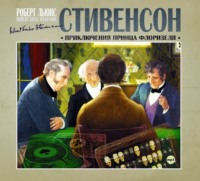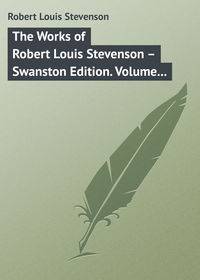 полная версия
полная версияFamiliar Studies of Men and Books
The Edinburgh magnates (to conclude this episode at once) behaved well to Burns from first to last. Were heaven-born genius to revisit us in similar guise, I am not venturing too far when I say that he need expect neither so warm a welcome nor such solid help. Although Burns was only a peasant, and one of no very elegant reputation as to morals, he was made welcome to their homes. They gave him a great deal of good advice, helped him to some five hundred pounds of ready money, and got him, as soon as he asked it, a place in the Excise. Burns, on his part, bore the elevation with perfect dignity; and with perfect dignity returned, when the time had come, into a country privacy of life. His powerful sense never deserted him, and from the first he recognised that his Edinburgh popularity was but an ovation and the affair of a day. He wrote a few letters in a high-flown, bombastic vein of gratitude; but in practice he suffered no man to intrude upon his self-respect. On the other hand, he never turned his back, even for a moment, on his old associates; and he was always ready to sacrifice an acquaintance to a friend, although the acquaintance were a duke. He would be a bold man who should promise similar conduct in equally exacting circumstances. It was, in short, an admirable appearance on the stage of life – socially successful, intimately self-respecting, and like a gentleman from first to last.
In the present study, this must only be taken by the way, while we return to Burns’s love affairs. Even on the road to Edinburgh he had seized upon the opportunity of a flirtation, and had carried the “battering” so far that when next he moved from town, it was to steal two days with this anonymous fair one. The exact importance to Burns of this affair may be gathered from the song in which he commemorated its occurrence. “I love the dear lassie,” he sings, “because she loves me;” or, in the tongue of prose: “Finding an opportunity, I did not hesitate to profit by it, and even now, if it returned, I should not hesitate to profit by it again.” A love thus founded has no interest for mortal man. Meantime, early in the winter, and only once, we find him regretting Jean in his correspondence. “Because” – such is his reason – “because he does not think he will ever meet so delicious an armful again;” and then, after a brief excursion into verse, he goes straight on to describe a new episode in the voyage of discovery with the daughter of a Lothian farmer for a heroine. I must ask the reader to follow all these references to his future wife; they are essential to the comprehension of Burns’s character and fate. In June, we find him back at Mauchline, a famous man. There, the Armour family greeted him with a “mean, servile compliance,” which increased his former disgust. Jean was not less compliant; a second time the poor girl submitted to the fascination of the man whom she did not love, and whom she had so cruelly insulted little more than a year ago; and, though Burns took advantage of her weakness, it was in the ugliest and most cynical spirit, and with a heart absolutely indifferent. Judge of this by a letter written some twenty days after his return – a letter to my mind among the most degrading in the whole collection – a letter which seems to have been inspired by a boastful, libertine bagman. “I am afraid,” it goes, “I have almost ruined one source, the principal one, indeed, of my former happiness – the eternal propensity I always had to fall in love. My heart no more glows with feverish rapture; I have no paradisiacal evening interviews.” Even the process of “battering” has failed him, you perceive. Still he had some one in his eye – a lady, if you please, with a fine figure and elegant manners, and who had “seen the politest quarters in Europe.” “I frequently visited her,” he writes, “and after passing regularly the intermediate degrees between the distant formal bow and the familiar grasp round the waist, I ventured, in my careless way, to talk of friendship in rather ambiguous terms; and after her return to – , I wrote her in the same terms. Miss, construing my remarks further than even I intended, flew off in a tangent of female dignity and reserve, like a mounting lark in an April morning; and wrote me an answer which measured out very completely what an immense way I had to travel before I could reach the climate of her favours. But I am an old hawk at the sport, and wrote her such a cool, deliberate, prudent reply, as brought my bird from her aerial towerings, pop, down to my foot, like Corporal Trim’s hat.” I avow a carnal longing, after this transcription, to buffet the Old Hawk about the ears. There is little question that to this lady he must have repeated his addresses, and that he was by her (Miss Chalmers) eventually, though not at all unkindly, rejected. One more detail to characterise the period. Six months after the date of this letter, Burns, back in Edinburgh, is served with a writ in meditatione fugæ, on behalf of some Edinburgh fair one, probably of humble rank, who declared an intention of adding to his family.
About the beginning of December (1787), a new period opens in the story of the poet’s random affections. He met at a tea party one Mrs. Agnes M’Lehose, a married woman of about his own age, who, with her two children, had been deserted by an unworthy husband. She had wit, could use her pen, and had read Werther with attention. Sociable, and even somewhat frisky, there was a good, sound, human kernel in the woman; a warmth of love, strong dogmatic religious feeling, and a considerable, but not authoritative, sense of the proprieties. Of what biographers refer to daintily as “her somewhat voluptuous style of beauty,” judging from the silhouette in Mr. Scott Douglas’s invaluable edition, the reader will be fastidious if he does not approve. Take her for all in all, I believe she was the best woman Burns encountered. The pair took a fancy for each other on the spot; Mrs. M’Lehose, in her turn, invited him to tea; but the poet, in his character of the Old Hawk, preferred a tête-à-tête, excused himself at the last moment, and offered a visit instead. An accident confined him to his room for nearly a month, and this led to the famous Clarinda and Sylvander correspondence. It was begun in simple sport; they are already at their fifth or sixth exchange, when Clarinda writes: “It is really curious so much fun passing between two persons who saw each other only once;” but it is hardly safe for a man and woman in the flower of their years to write almost daily, and sometimes in terms too ambiguous, sometimes in terms too plain, and generally in terms too warm, for mere acquaintance. The exercise partakes a little of the nature of battering, and danger may be apprehended when next they meet. It is difficult to give any account of this remarkable correspondence; it is too far away from us, and perhaps, not yet far enough, in point of time and manner; the imagination is baffled by these stilted literary utterances, warming, in bravura passages, into downright truculent nonsense. Clarinda has one famous sentence in which she bids Sylvander connect the thought of his mistress with the changing phases of the year; it was enthusiastically admired by the swain, but on the modern mind produces mild amazement and alarm. “Oh, Clarinda,” writes Burns, “shall we not meet in a state – some yet unknown state – of being, where the lavish hand of Plenty shall minister to the highest wish of Benevolence, and where the chill north wind of Prudence shall never blow over the flowery field of Enjoyment?” The design may be that of an Old Hawk, but the style is more suggestive of a Bird of Paradise. It is sometimes hard to fancy they are not gravely making fun of each other as they write. Religion, poetry, love, and charming sensibility, are the current topics. “I am delighted, charming Clarinda, with your honest enthusiasm for religion,” writes Burns; and the pair entertained a fiction that this was their “favourite subject.” “This is Sunday,” writes the lady, “and not a word on our favourite subject. O fy ‘divine Clarinda!’” I suspect, although quite unconsciously on the part of the lady, who was bent on his redemption, they but used the favourite subject as a stalking-horse. In the meantime, the sportive acquaintance was ripening steadily into a genuine passion. Visits took place, and then became frequent. Clarinda’s friends were hurt and suspicious; her clergyman interfered; she herself had smart attacks of conscience, but her heart had gone from her control; it was altogether his, and she “counted all things but loss – heaven excepted – that she might win and keep him.” Burns himself was transported while in her neighbourhood, but his transports somewhat rapidly declined during an absence. I am tempted to imagine that, womanlike, he took on the colour of his mistress’s feeling; that he could not but heat himself at the fire of her unaffected passion; but that, like one who should leave the hearth upon a winter’s night, his temperature soon fell when he was out of sight, and in a word, though he could share the symptoms, that he had never shared the disease. At the same time, amid the fustian of the letters there are forcible and true expressions, and the love verses that he wrote upon Clarinda are among the most moving in the language.
We are approaching the solution. In mid-winter, Jean, once more in the family way, was turned out of doors by her family; and Burns had her received and cared for in the house of a friend. For he remained to the last imperfect in his character of Don Juan, and lacked the sinister courage to desert his victim. About the middle of February (1788), he had to tear himself from his Clarinda and make a journey into the south-west on business. Clarinda gave him two shirts for his little son. They were daily to meet in prayer at an appointed hour. Burns, too late for the post at Glasgow, sent her a letter by parcel that she might not have to wait. Clarinda on her part writes, this time with a beautiful simplicity: “I think the streets look deserted-like since Monday; and there’s a certain insipidity in good kind folks I once enjoyed not a little. Miss Wardrobe supped here on Monday. She once named you, which kept me from falling asleep. I drank your health in a glass of ale – as the lasses do at Hallowe’en – ‘in to mysel’.’” Arrived at Mauchline, Burns installed Jean Armour in a lodging, and prevailed on Mrs. Armour to promise her help and countenance in the approaching confinement. This was kind at least; but hear his expressions: “I have taken her a room; I have taken her to my arms; I have given her a mahogany bed; I have given her a guinea… I swore her privately and solemnly never to attempt any claim on me as a husband, even though anybody should persuade her she had such a claim – which she has not, neither during my life nor after my death. She did all this like a good girl.” And then he took advantage of the situation. To Clarinda he wrote: “I this morning called for a certain woman. I am disgusted with her; I cannot endure her;” and he accused her of “tasteless insipidity, vulgarity of soul, and mercenary fawning.” This was already in March; by the thirteenth of that month he was back in Edinburgh. On the 17th, he wrote to Clarinda: “Your hopes, your fears, your cares, my love, are mine; so don’t mind them. I will take you in my hand through the dreary wilds of this world, and scare away the ravening bird or beast that would annoy you.” Again, on the 21st: “Will you open, with satisfaction and delight, a letter from a man who loves you, who has loved you, and who will love you, to death, through death, and for ever… How rich am I to have such a treasure as you!.. ‘The Lord God knoweth,’ and, perhaps, ‘Israel he shall know,’ my love and your merit. Adieu, Clarinda! I am going to remember you in my prayers.” By the 7th of April, seventeen days later he had already decided to make Jean Armour publicly his wife.
A more astonishing stage-trick is not to be found. And yet his conduct is seen, upon a nearer examination, to be grounded both in reason and in kindness. He was now about to embark on a solid worldly career; he had taken a farm; the affair with Clarinda, however gratifying to his heart, was too contingent to offer any great consolation to a man like Burns, to whom marriage must have seemed the very dawn of hope and self-respect. This is to regard the question from its lowest aspect; but there is no doubt that he entered on this new period of his life with a sincere determination to do right. He had just helped his brother with a loan of a hundred and eighty pounds; should he do nothing for the poor girl whom he had ruined? It was true he could not do as he did without brutally wounding Clarinda; that was the punishment of his bygone fault; he was, as he truly says, “damned with a choice only of different species of error and misconduct.” To be professional Don Juan, to accept the provocation of any lively lass upon the village green, may thus lead a man through a series of detestable words and actions, and land him at last in an undesired and most unsuitable union for life. If he had been strong enough to refrain or bad enough to persevere in evil; if he had only not been Don Juan at all, or been Don Juan altogether, there had been some possible road for him throughout this troublesome world; but a man, alas! who is equally at the call of his worse and better instincts, stands among changing events without foundation or resource. 3
Downward CourseIt may be questionable whether any marriage could have tamed Burns; but it is at least certain that there was no hope for him in the marriage he contracted. He did right, but then he had done wrong before; it was, as I said, one of those relations in life which it seems equally wrong to break or to perpetuate. He neither loved nor respected his wife. “God knows,” he writes, “my choice was as random as blind man’s buff.” He consoles himself by the thought that he has acted kindly to her; that she “has the most sacred enthusiasm of attachment to him;” that she has a good figure; that she has a “wood-note wild,” “her voice rising with ease to B natural,” no less. The effect on the reader is one of unmingled pity for both parties concerned. This was not the wife who (in his own words) could “enter into his favourite studies or relish his favourite authors;” this was not even a wife, after the affair of the marriage lines, in whom a husband could joy to place his trust. Let her manage a farm with sense, let her voice rise to B natural all day long, she would still be a peasant to her lettered lord, and an object of pity rather than of equal affection. She could now be faithful, she could now be forgiving, she could now be generous even to a pathetic and touching degree; but coming from one who was unloved, and who had scarce shown herself worthy of the sentiment, these were all virtues thrown away, which could neither change her husband’s heart nor affect the inherent destiny of their relation. From the outset, it was a marriage that had no root in nature; and we find him, ere long, lyrically regretting Highland Mary, renewing correspondence with Clarinda in the warmest language, on doubtful terms with Mrs. Riddel, and on terms unfortunately beyond any question with Anne Park.
Alas! this was not the only ill circumstance in his future. He had been idle for some eighteen months, superintending his new edition, hanging on to settle with the publisher, travelling in the Highlands with Willie Nichol, or philandering with Mrs. M’Lehose; and in this period the radical part of the man had suffered irremediable hurt. He had lost his habits of industry, and formed the habit of pleasure. Apologetical biographers assure us of the contrary; but from the first, he saw and recognised the danger for himself; his mind, he writes, is “enervated to an alarming degree” by idleness and dissipation; and again, “my mind has been vitiated with idleness.” It never fairly recovered. To business he could bring the required diligence and attention without difficulty; but he was thenceforward incapable, except in rare instances, of that superior effort of concentration which is required for serious literary work. He may be said, indeed, to have worked no more, and only amused himself with letters. The man who had written a volume of masterpieces in six months, during the remainder of his life rarely found courage for any more sustained effort than a song. And the nature of the songs is itself characteristic of these idle later years; for they are often as polished and elaborate as his earlier works were frank, and headlong, and colloquial; and this sort of verbal elaboration in short flights is, for a man of literary turn, simply the most agreeable of pastimes. The change in manner coincides exactly with the Edinburgh visit. In 1786 he had written the Address to a Louse, which may be taken as an extreme instance of the first manner; and already, in 1787, we come upon the rosebud pieces to Miss Cruikshank, which are extreme examples of the second. The change was, therefore, the direct and very natural consequence of his great change in life; but it is not the less typical of his loss of moral courage that he should have given up all larger ventures, nor the less melancholy that a man who first attacked literature with a hand that seemed capable of moving mountains, should have spent his later years in whittling cherry-stones.
Meanwhile, the farm did not prosper; he had to join to it the salary of an exciseman; at last he had to give it up, and rely altogether on the latter resource. He was an active officer; and, though he sometimes tempered severity with mercy, we have local testimony oddly representing the public feeling of the period, that, while “in everything else he was a perfect gentleman, when he met with anything seizable he was no better than any other gauger.”
There is but one manifestation of the man in these last years which need delay us: and that was the sudden interest in politics which arose from his sympathy with the great French Revolution. His only political feeling had been hitherto a sentimental Jacobitism, not more or less respectable than that of Scott, Aytoun, and the rest of what George Borrow has nicknamed the “Charlie over the water” Scotchmen. It was a sentiment almost entirely literary and picturesque in its origin, built on ballads and the adventures of the Young Chevalier; and in Burns it is the more excusable, because he lay out of the way of active politics in his youth. With the great French Revolution, something living, practical, and feasible appeared to him for the first time in this realm of human action. The young ploughman who had desired so earnestly to rise, now reached out his sympathies to a whole nation animated with the same desire. Already in 1788 we find the old Jacobitism hand in hand with the new popular doctrine, when, in a letter of indignation against the zeal of a Whig clergyman, he writes: “I daresay the American Congress in 1776 will be allowed to be as able and as enlightened as the English Convention was in 1688; and that their posterity will celebrate the centenary of their deliverance from us, as duly and sincerely as we do ours from the oppressive measures of the wrong-headed house of Stuart.” As time wore on, his sentiments grew more pronounced and even violent; but there was a basis of sense and generous feeling to his hottest excess. What he asked was a fair chance for the individual in life; an open road to success and distinction for all classes of men. It was in the same spirit that he had helped to found a public library in the parish where his farm was situated, and that he sang his fervent snatches against tyranny and tyrants. Witness, were it alone, this verse: —
“Here’s freedom to him that wad read,Here’s freedom to him that wad write;There’s nane ever feared that the truth should be heardBut them wham the truth wad indite.”Yet his enthusiasm for the cause was scarce guided by wisdom. Many stories are preserved of the bitter and unwise words he used in country coteries; how he proposed Washington’s health as an amendment to Pitt’s, gave as a toast “the last verse of the last chapter of Kings,” and celebrated Dumouriez in a doggrel impromptu full of ridicule and hate. Now his sympathies would inspire him with Scots, wha hae; now involve him in a drunken broil with a loyal officer, and consequent apologies and explanations, hard to offer for a man of Burns’s stomach. Nor was this the front of his offending. On February 27, 1792, he took part in the capture of an armed smuggler, bought at the subsequent sale four carronades, and despatched them with a letter to the French Assembly. Letter and guns were stopped at Dover by the English officials; there was trouble for Burns with his superiors; he was reminded firmly, however delicately, that, as a paid official, it was his duty to obey and to be silent; and all the blood of this poor, proud, and falling man must have rushed to his head at the humiliation. His letter to Mr. Erskine, subsequently Earl of Mar, testifies, in its turgid, turbulent phrases, to a perfect passion of alarmed self-respect and vanity. He had been muzzled, and muzzled, when all was said, by his paltry salary as an exciseman; alas! had he not a family to keep? Already, he wrote, he looked forward to some such judgment from a hackney scribbler as this: “Burns, notwithstanding the fanfaronnade of independence to be found in his works, and after having been held forth to view and to public estimation as a man of some genius, yet, quite destitute of resources within himself to support his borrowed dignity, he dwindled into a paltry exciseman, and shrunk out the rest of his insignificant existence in the meanest of pursuits, and among the vilest of mankind.” And then on he goes, in a style of rhodomontade, but filled with living indignation, to declare his right to a political opinion, and his willingness to shed his blood for the political birthright of his sons. Poor, perturbed spirit! he was indeed exercised in vain; those who share and those who differ from his sentiments about the Revolution, alike understand and sympathise with him in this painful strait; for poetry and human manhood are lasting like the race, and politics, which are but a wrongful striving after right, pass and change from year to year and age to age. The Twa Dogs has already outlasted the constitution of Siéyès and the policy of the Whigs; and Burns is better known among English-speaking races than either Pitt or Fox.
Meanwhile, whether as a man, a husband, or a poet, his steps led downward. He knew, knew bitterly, that the best was out of him; he refused to make another volume, for he felt that it would be a disappointment; he grew petulantly alive to criticism, unless he was sure it reached him from a friend. For his songs, he would take nothing; they were all that he could do; the proposed Scotch play, the proposed series of Scotch tales in verse, all had gone to water; and in a fling of pain and disappointment, which is surely noble with the nobility of a viking, he would rather stoop to borrow than to accept money for these last and inadequate efforts of his muse. And this desperate abnegation rises at times near to the height of madness; as when he pretended that he had not written, but only found and published, his immortal Auld Lang Syne. In the same spirit he became more scrupulous as an artist; he was doing so little, he would fain do that little well; and about two months before his death, he asked Thomson to send back all his manuscripts for revisal, saying that he would rather write five songs to his taste than twice that number otherwise. The battle of his life was lost; in forlorn efforts to do well, in desperate submissions to evil, the last years flew by. His temper is dark and explosive, launching epigrams, quarrelling with his friends, jealous of young puppy officers. He tries to be a good father; he boasts himself a libertine. Sick, sad, and jaded, he can refuse no occasion of temporary pleasure, no opportunity to shine; and he who had once refused the invitations of lords and ladies is now whistled to the inn by any curious stranger. His death (July 21, 1796), in his thirty-seventh year, was indeed a kindly dispensation. It is the fashion to say he died of drink; many a man has drunk more and yet lived with reputation, and reached a good age. That drink and debauchery helped to destroy his constitution, and were the means of his unconscious suicide, is doubtless true; but he had failed in life, had lost his power of work, and was already married to the poor, unworthy, patient Jean, before he had shown his inclination to convivial nights, or at least before that inclination had become dangerous either to his health or his self-respect. He had trifled with life, and must pay the penalty. He had chosen to be Don Juan, he had grasped at temporary pleasures, and substantial happiness and solid industry had passed him by. He died of being Robert Burns, and there is no levity in such a statement of the case; for shall we not, one and all, deserve a similar epitaph?









